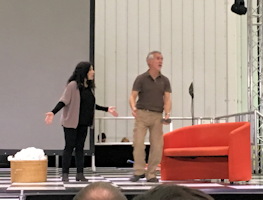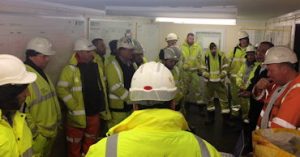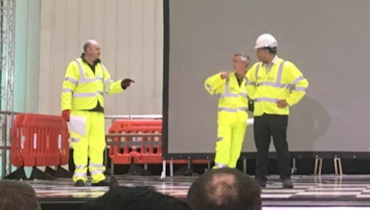Ben writes:
I attended an excellent stand-down day on the A14 in December.
The event was held at the IWM Duxford RAF War Museum. There were two briefings of around four hours each, with the day split into two halves to reduce the numbers inside the museum.
The start of the briefing was a message from the project director Mark Berg:
“Over the last month, the A14 has had 30 incidents, with 60% classified as high to medium risk. In September, we had our first RIDDOR reportable injury and four lost time incidents. We cannot ignore what the data is telling us. On this basis, I have decided that we need to stop work for a day to reflect on these events, and consider again the role that we must all play to ensure that everyone returns home safely… every day!”
There were also other speakers, including a woman who had lost her brother from an electrical accident. She does regular presentations across the country to help try to prevent other accidents.
The sessions included audience involvement, with answers to surveys and safety questions gathered from people’s phones.
Role-play
There were several roleplaying scenes. They related to the working life of a supervisor / general foreman, and how working away from home and long hours affects home life and stress. They showed the pressure supervisors can feel from project managers.
This can filter through to the operatives, with information missed or overlooked due to milestones and timing of the work.
The picture above shows the project director, general foreman and supervisor in the office before an incident. In this storyline an operative struck a high-voltage cable whilst carrying out trial hole works to uncover a buried service. The role-play showed how things can easily go wrong if fundamental site rules are not followed.
This accident was because there was an emphasis on just getting the job done, and supervision issues. These led to
- people working on without stopping when things changed
- briefing not being in enough depth
- people not raising issues when they did not understand the drawings
- operatives skipping vital checks (CAT scan) before carrying out the works.
The operative who sustained injuries from the HV cable was badly injured. It proceeded to turn into a full accident investigation.
Later in the session a court case was acted out. It showed the high level of sentencing and fines a company and all involved within the accident can face if deemed at fault.
Safety a priority

VGC’s HSQE team is involved in other work to support safety on the A14 project. For example, HSQE manager Richard Wheeler attended site recently to give a toolbox talk on language (photo on the left), discussing how inclusive language makes everyone work better and safer.
Richard has also delivered talks on mental health, and reminded people about our partnership with Samaritans, which offers free support to anyone who wants to contact them.

Find out more about the A14 project.
Please get in touch if you’d like to know more about our toolbox talks.
